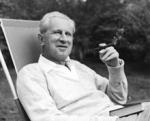Disable ads!
Herbert Marcuse
Part of a series on the Frankfurt School Major works Reason and Revolution The Work of Art in the Age of Mechanical Reproduction Eclipse of Reason Escape from Freedom Dialectic of Enlightenment Minima Moralia Eros and Civilization One-Dimensional Man Negative Dialectics The Structural Transformation of the Public Sphere The Theory of Communicative Action Notable theorists Max Horkheimer · Theodor Adorno Herbert Marcuse · Walter Benjamin Erich Fromm · Friedrich Pollock Leo Löwenthal · Jürgen Habermas Alfred Schmidt · Axel Honneth Important concepts Critical theory · Dialectic · Praxis Psychoanalysis · Antipositivism Popular culture · Culture industry Advanced capitalism Privatism · Non-identity Communicative rationality Legitimation crisis v t e Herbert Marcuse (German: [maʀˈkuːzə]; July 19, 1898 – July 29, 1979) was a German American philosopher, sociologist, and political theorist, associated with the Frankfurt School of critical theory. Born in Berlin, Marcuse studied at the universities of Berlin and then at Freiburg, where he received his Ph.D. He was a prominent figure in the Frankfurt-based Institute for Social Research – what later became known as the Frankfurt School. He was married to Sophie Wertheim (1924–1951), Inge Neumann (1955–1972), and Erica Sherover (1976–1979). In his written works, he criticized capitalism, modern technology, historical materialism and entertainment culture, arguing that they represent new forms of social control. After his studies, in the late 1960s and the 1970s he became known as the preeminent theorist of the New Left and the student movements of Germany, France, and the US. Between 1943 and 1950, Marcuse worked in US Government Service, which helped form the basis of his book Soviet Marxism: A Critical Analysis (1958). Celebrated as the "Father of the New Left", his best known works are Eros and Civilization (1955) and One-Dimensional Man (1964). His Marxist scholarship inspired many radical intellectuals and political activists in the 1960s and 1970s, both in the U.S. and internationally.
 Read more on wikipedia.org Read more on wikipedia.org
 All quotes by Herbert Marcuse All quotes by Herbert Marcuse
 Edit Edit
|

|
|
|
|
|
Background photo by Giuliana
|